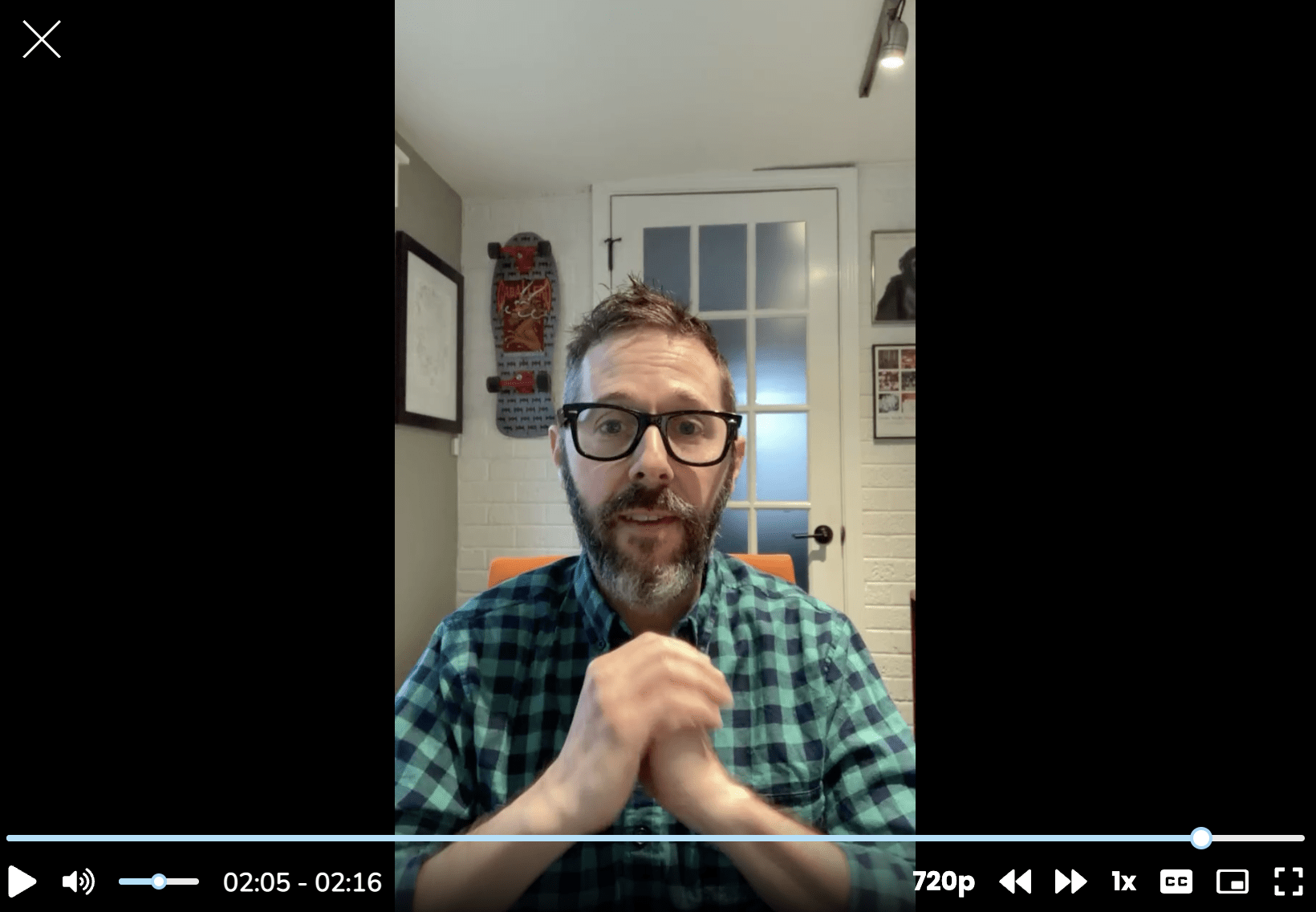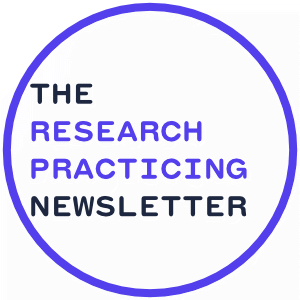Research Practicing for 5 February 2023
Hello!
This is the latest Research Practicing newsletter by Gregg Bernstein. Thank you for subscribing.
I love a good prompt. If there’s anything you’d like to see me cover in a future dispatch, get in touch!
Now here's what's hot off the presses this week at gregg.io:
- He gets on base: I went heads down 18 months ago to focus on my work and my team. Since then I’ve come up with a plan to find balance going forward
- Grow your impact, then your team: I expanded on a video for the Learners community to explain why hiring is your last resort
- Where should research report in an organization? For the Learners community, I attempted to answer where I think research should report in an organization
Read on…
He gets on base
I’m not going to recap Michael Lewis’s essential book Moneyball, nor the (somehow) even better movie. But one thing Moneyball captured was that Oakland A’s general manager Billy Beane prioritized players who get on base. How they get on base was irrelevant to Beane. Home run, single, walk—it didn’t matter. Players who get on base are players who create opportunities to score and win, and a win is the most important outcome.

My professional mindset has always been to find and share the lesson in what I’m doing for a receptive audience—a practice I carried from my previous life in academia. It’s why some of my happiest career highlights are contributing to the Mailchimp UX newsletter, writing for the Vox Product blog, and building a growing audience for my newsletter. But in August of 2021 I started a new role with a new personal mission: take the time and space to just do the work without distraction.
I entered what Dorie Clark labeled heads down mode. I focused on growing as a people manager and research leader, which meant very little public writing, minimal engagement on social networks, and no public speaking unless I could just show up to a panel discussion or interview.
To take this back to the top, I stopped playing ball. I needed to explore and reflect without the (internal) pressure to do anything other than show up for my colleagues. For what it’s worth, I spent my heads down time noodling on these questions:
- How have I been managed? How might I manage my team? How should I manage my team? For these questions, I highly recommend Lara Hogan’s Resilient Management and professional coaching from Mandy Brown.
- In a large, global organization, how has user research worked? How might it work? How should it work?
I certainly didn’t come up with all the answers, but that wasn’t the point, either. I removed the pressure on myself to have any of the answers except those that mattered for me and my team.
Learning how to baseball again
Toward the end of 2022, I felt ready to go heads up again—I was ready to start engaging publicly. But I also wanted to keep the (internal) pressure off and maintain my focus. A couple of things helped me see a path toward sharing again within the boundaries and structure I’ve relished for the last 18 months.
First, my friend Kyle Lambert shared some practical advice about writing blog posts quickly in his excellent newsletter. My takeaway from Kyle was a reminder to stop being so precious about writing and just let it rip. I mean, I have a blog—it’s mine. I can just throw stuff up there as often as I’d like (or not!), even if it’s half-baked or includes references to movie adaptations of nerdy baseball books.
Second, I started to create short responses to video prompts about user research for the Learners community. These videos are liberating, and continue the theme of not being precious: record my thoughts, upload, and get on with my day.
So here’s my plan to just try to get on base going forward.
- I’m going to write more blog posts—some long, mostly very short. And I’m time-boxing myself to the wee hours of the morning before my family awakens.
- I’m going to create Learners videos when I have a cogent thought, but only in the few minutes before my first morning meeting of the day.
- I’m going to create blog posts based on Learners videos, as I’ve done about growing a research team and where research should report to.
- I am going to answer your questions! What’s on your mind? Hit me up and let me know what in the world of user research or publishing or book authoring or midwestern emo album design or whatever I can try to answer for you.
If this sounds remotely tolerable, and you’d like to keep up with my posts, you can visit my website from time to time. Or you can opt for efficiency by subscribing to my posts via my newsletter—every week you will receive a digest of whatever I wrote that week. If you don’t receive a newsletter, it’s because I had nothing to share that week.
Play ball.
For the Learners community, I tackled the question, “How do you grow a research team at a company that has never had one?” Check out the video here.
 Me talking about growing a research team (screenshot only—click here to watch!)
Me talking about growing a research team (screenshot only—click here to watch!)
That question presupposes that a team is the right way to grow research. I say that because headcount is always the easy answer to building a new function, but a good research leader—a good leader, period—needs to know all the levers to pull before landing on headcount. We saw the repercussions of rapid scaling play out in recent layoffs across the tech sector, so instead let’s focus on avenues to explore before opening a role.
Before growing a team, focus on growing your research capabilities and your remit. What are the things you as a team of one can do now through your work, your findings, or your partnerships with others in the org?
Maybe it’s democratizing tools and datasets that others didn’t know about to support critical decisions. What if it turns out your org needs better management of existing assets and not a human?
Maybe it’s creating playbooks and templates folks can follow to talk to users themselves. What if it turns out everyone is perfectly capable of conducting Just Enough Research and your role is to create infrastructure and uphold best practices?
Maybe it’s meeting with leaders around your org to understand what information would help them make better decisions. Now we’re getting somewhere. What if it turns out the questions aren’t so numerous that you can’t address them yourself?
Now, after you’ve done all you can as a team of one to set everyone up for success, take stock of what gaps remain. Identify where the consistent demand for research is coming from and that should tell you how to scale through headcount.
But! Even then, hiring doesn’t necessarily mean committing to a full time hire. Do you need a researcher to embed with a specific team doing high priority work? Test the waters by hiring a contractor to see if having another body is the right approach.
You might even discover that you have all things research covered, but you lack the time to invest in recruiting, panel management, scheduling, and compensation. Congrats, now you know you need to hire a research operations specialist.
Once you exhaust all other possibilities and identify the human-shaped hole in your research function, you can make a clear business case for hiring. Not only that, you can set your eventual hire up for success by articulating to them exactly how they will help your organization.
Growing a team is amazing, to be sure! But the real work is everything that happens before you add headcount.
Where should research report in an organization?
This post went out through a premature newsletter send last weekend.
The gist:
For research to succeed, the reporting structure and the org chart are less important than the answers to these two questions:
- Is the person who research rolls up to empowering research?
- And is that person mandating that research is a key part of the decision making process?
If you read it, great! In case you missed it, you can read it on my site.
One great link
The Power of a Catchy Name: How naming your UX research findings can make them stick. Great tips from Thomas Stokes on creating captivating and memorable names.
Onward,
Gregg
- Want to offer feedback or a suggestion for a future issue? Hit reply or get in touch here
- Access all my content on my website, gregg.io
- Buy my book, Research Practice
